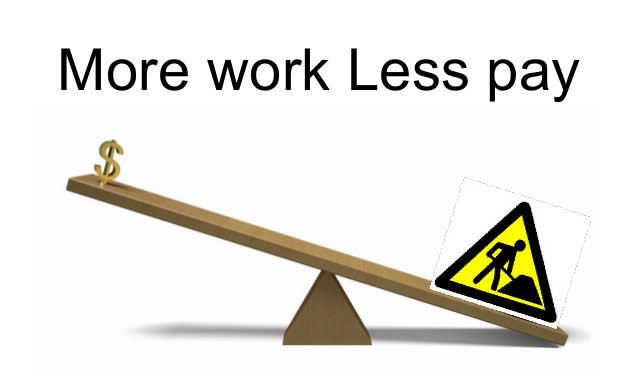More work, no more pay and no evidence of improved health incomes – welcome to the world of GPs
More work, no more pay and no evidence of improved health incomes – welcome to the world of general practice
The militant construction union, the CFMEU has responded to a government freeze till 2020 on how much construction workers get paid. They have decided to increase the workload of their members.
This will not actually change the end result or finish date of any building. However it will increase the amount of paperwork. While acknowledging their members would do more work for no more pay, the union said it was committed to quality construction.
This is fiction. It will never happen.
But let’s compare this to the situation facing GPs. And yes, before you all start, of course there are differences between employed construction workers and professional, often self-employed, doctors.
Nonetheless, the comparison comes to mind when looking at the draft new standards the College has put out. The first question that has to be asked is where is the problem with the current standard of general practice?
I do not mean the small percentage of GPs whose work is inferior to what is expected – every field of human endeavour has this group. Nor do I mean not meeting the meaningless proxy markers of “quality” loved by academics and bureaucrats. I mean, what is the problem with the overall standard of health care delivered by Australian GPs to the communities they serve.
Life expectancy has continued to climb over the last two decades. General practice cannot take all the credit for this, but plays a part. It is also well documented that general practice is one of the most cost effective parts of the health system.
Among the proposed new standards are requirements to document in patient notes details of every “extra” person in the room. This might be a spouse or a medical student. GPs must know the price of services referred to, and practices have an automated external defibrillator (a non-mandatory standard).
Let’s take these in reverse order.
In nearly 30 years of general practice I have never thought “Gee I wish I had a defibrillator right now”. For 10 years I supervised exercise stress tests never once needing to use the (justifiable) defibrillator.
“Non-mandatory” is the prelude to making it mandatory (at considerable cost) next time. Has a cost-benefit analysis been done? Of course not!
How exactly is a GP supposed to know the price of every service offered by specialists, allied health professionals or other services they refer to? In many instances we won’t even know what service the patient may receive. What’s next? Knowing the price of lunch at a patient’s preferred restaurant or the cost of their next car?
This is not a standard of medical practice.
Recording the name of medical students, which will discourage GPs from taking students, or other people in attendance, adds no value. It’s just additional paperwork. Where do we draw the line? Do we detail the name of the parent who brings in a child? And up to what age?
No doubt, the disingenuous excuse about legal protection (for the GP) will be trotted out to support this. If the College had not raised it, even the lawyers might have struggled to come up with this reason to litigate.
I defy anyone to explain how this will improve health outcomes.
For the next set of standards, should we add the address and date of birth of the “extra” person? Maybe their tax file number too?
Back in the real world, rebates for GP services under Medicare are now frozen till 2020. Though free to charge as much or little as we see fit, the reality is that some 80% of GP services are direct billed to Medicare.
Knowing this, why on earth should GPs be offering to do any more work? These extra so-called standards will not improve health outcomes. There is no problem with the standard of general practice that these extra requirements are “fixing”.
And while we are patting ourselves on the back about Medical Homes, has anyone thought about how GPs are going to be paid? The reality is that workload will go up and effective payments per hour will go down.
What is wrong with us? What other group of people would voluntarily offer to do more administrative work (which does not benefit the user) when they have already been told that they will not receive an additional cent?
What other group with good results plus high community satisfaction and trust ratings beats itself up over its supposed failings?
And what other group would offer government something for nothing?
Any and all suggestions welcomed.
Dr Joe Kosterich is a general practitioner in Perth.
For more articles go to: www.drjoetoday.com


